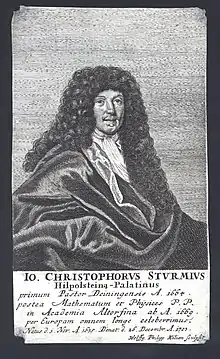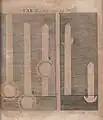Johann Sturm
Johann Christoph Sturm (3 November 1635 – 26 December 1703)[1] was a German philosopher, professor at University of Altdorf and founder of a short-lived scientific academy known as the Collegium Curiosum, based on the model of the Florentine Accademia del Cimento.[2] He edited two volumes of the academy's proceedings under the title Collegium Experimentale (1676 and 1685).[2] In 1670, he translated the works of Archimedes into German.[1]
Johann Sturm | |
|---|---|
 | |
| Born | 3 November 1635 |
| Died | 26 December 1703 (aged 68) |
| Nationality | German |
| Occupation | Philosopher |
Sturm is the author of Physica Electiva (1697), a book that criticized Gottfried Wilhelm Leibniz and prompted him to publish a rebuke. Sturm's critique was aimed at Leibniz's view that Nature and/or its constituent parts possess some creative force of their own. This criticism was partly theological, in that Sturm claimed Leibniz's view of Nature undermined the sovereignty of the Christian God.[3]
Works
- Collegium experimentale, Nuremberg: Endter, vol. 1 (1676), available here and here; vol. 2 (1685) available here, here, and here.
- Physica electiva sive hypothetica, vol 1, Nuremberg: Endter, 1697, available here and here; vol.2, Altdorf: Kohles, 1698.
As well as the following: [4]
- Mathesis Juvenilis
- Physica Modernae Compendium
- Praelectiones Academicae
- A list of works by Sturm with links to online versions is available at Astronomie in Nürnberg, section "Ausgewählte Werke".
 Illustratiom from Excerpta ex literis... published in Acta Eruditorum, 1690
Illustratiom from Excerpta ex literis... published in Acta Eruditorum, 1690 Physica electiva sive hypothetica
Physica electiva sive hypothetica
Further reading
- Ahnert, Thomas (2002), The Culture of Experimentalism in the Holy Roman Empire: Johann Christoph Sturm (1635-1703) and the Collegium Experimentale Archived 2020-06-06 at the Wayback Machine.
- Wiesenfeldt, Gerhard, "Speculative and Experimental Philosophy in Universities: Eclecticism Archived 2011-08-09 at the Wayback Machine", Early Modern Experimental Philosophy, 6 December 2010.
- A philosophical and mathematical dictionary by Charles Hutton[5]
- The Biographical Treasury by Samuel Maunder[6]
- John Gorton's General Biographical Dictionary[7]
- Alexander Chalmers' General Biographical Dictionary[4]
References
- Tooke, W.; Beloe, W.; Nares, R. (1798). A New and General Biographical Dictionary. G. G. and J. Robinson. p. 221.
- "Academies: Scientific Academies". Encyclopaedia Britannica. Vol. 1 (14 ed.). 1930. p. 81.
- Gottfried Leibniz, Philosophical Papers and Letters, ed. by Leroy Loemker, (Dordrecht, Holland: D. Reidel Publishing, 1969) 499-508.
- Chalmers, A. (1816). The General Biographical Dictionary: Containing an Hist. and Crit. Account of the Lives and Writings of the Most Eminent Persons in Every Nation; Particularly the British and Irish; from the Earliest Accounts to the Present Time. Sim - Sty. Vol. 28. Nichols. p. 495. Retrieved 2017-01-08.
- "Archimedes Project". archimedes.mpiwg-berlin.mpg.de. Retrieved 2017-01-08.
- Maunder, S. (1838). The biographical treasury: a dictionary of universal biography. Longman. Retrieved 2017-01-08.
- Gorton, J. (1838). A General Biographical Dictionary. Vol. 3. Whittaker and Company. Retrieved 2017-01-08.